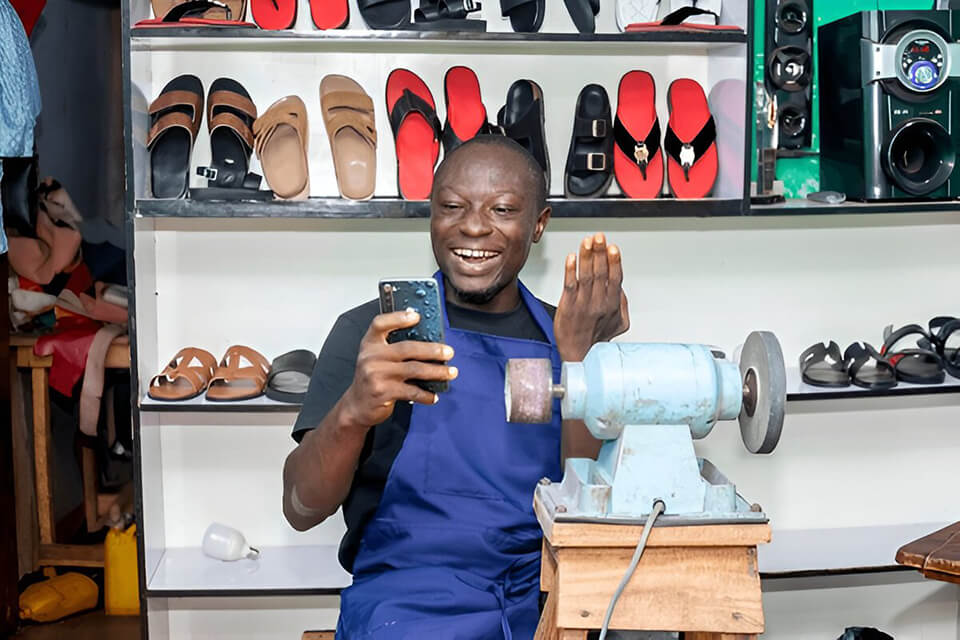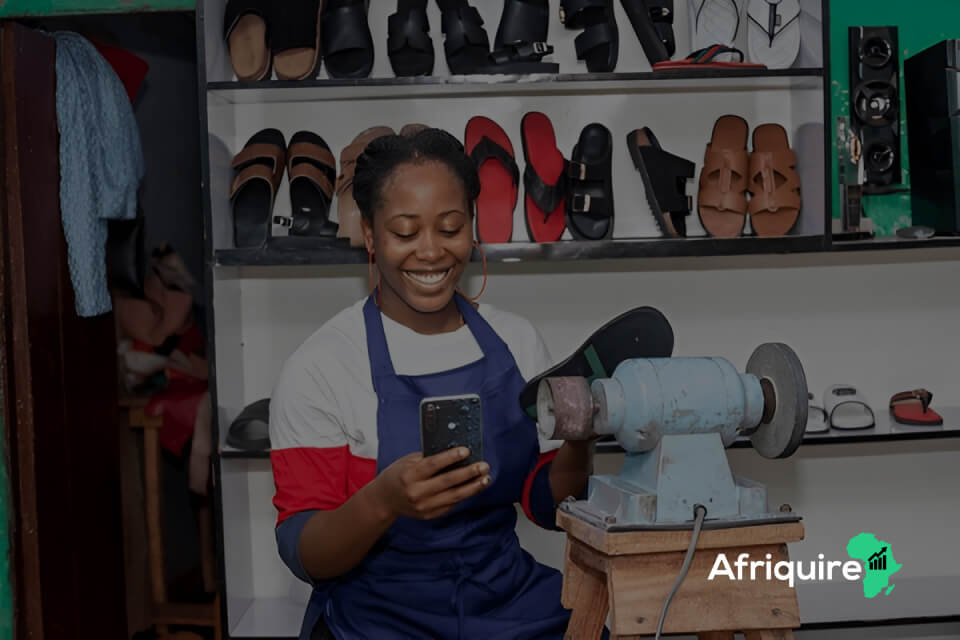Introduction
Social media has rapidly become a powerful tool to leverage social media for youth empowerment across Africa, connecting millions of young people through shared voices, ideas, and transformative opportunities. As African youth increasingly access platforms like Twitter, Instagram, and TikTok, the potential for meaningful change and community development grows immensely. Social media is more than a communication tool; it’s a bridge to empowerment, enabling African youth to connect across borders, learn from one another, and advocate for issues that matter most to their generation.
Social media, a platform that amplifies youth voices, allows young Africans to access life-changing tools and information by offering resources like educational content, job listings, and mentorship networks. These platforms also serve as a stage where youth can express their views, amplify their voices on social issues, and mobilize support for vital causes. This article will explore how to leverage social media for youth empowerment in Africa, unlocking ways for positive impact and community growth.
The Power of Social Media in Youth Engagement
Social media has significantly transformed youth engagement in Africa, providing a vital platform for young people to connect, share their perspectives, and mobilize for meaningful change. Through these dynamic networks, African youth can discuss pressing issues, advocate for necessary reforms, and create supportive communities that foster growth. By utilizing these digital tools, young people can leverage social media for youth empowerment in Africa, uniting to collaborate on projects, raise awareness, and amplify their voices like never before. This digital landscape encourages active participation, fostering a sense of belonging and purpose among the youth, and it’s important to note that the amplification of youth voices through social media is unprecedented, making the magnitude of change felt by all.
- Reach and Connectivity
Social media connects African youth across borders, enabling vibrant communication and collaboration. Through platforms like Facebook, Twitter, and WhatsApp, young people can network far beyond their immediate communities, gaining insights and inspiration from peers across the continent. This digital connection nurtures a shared sense of purpose and identity, bridging gaps caused by geography, economic disparity, or limited resources. By leveraging social media for youth empowerment in Africa, these connections become tools for growth and positive impact.
- Voice and Advocacy
Social media provides youth with a powerful platform to amplify their voices on critical social, political, and economic issues. Platforms like Twitter, Instagram, and TikTok have emerged as popular spaces where African youth engage in discussions about pressing topics such as climate change, governance, and social justice. Along with creating content and participating in meaningful dialogues, young people can advocate for policies and societal changes that align with their needs and perspectives. This active engagement not only empowers them but also strengthens their roles as advocates for their communities. Importantly, it fosters collective action, making each feel connected and part of a more significant movement, thereby increasing awareness and impact.
- Building Communities and Movements
Social media enables African youth to create communities focused on empowerment and shared purpose. Through Facebook groups, Twitter spaces, and Instagram pages, young people connect, collaborate, and organize around causes that matter to them, from social justice to educational access. Movements like #EndSARS in Nigeria and #FeesMustFall in South Africa highlight the immense power of these digital communities, where young voices unite to demand reform and justice. Together, they foster change, demonstrating the impact of collective action across the continent.
- Access to Information and Opportunities
Social media has become a crucial gateway to valuable resources, giving African youth unprecedented access to educational content, job opportunities, and entrepreneurship programs. Dedicated pages offer career advice, online courses, and mentorship programs, equipping young Africans with essential skills for personal and professional growth. This digital landscape has democratized access to these resources, making it easier for youth across the continent to pursue their ambitions, enhance their expertise, and secure opportunities previously limited by location or socioeconomic barriers.

Best Practices for Youth Empowerment Campaigns on Social Media
Running successful youth empowerment campaigns on social media requires strategies that resonate with young audiences. Practical approaches include creating relatable, inspiring content that engages viewers and using interactive tools like polls or Q&A sessions to foster participation. Another effective strategy is collaborating with influencers. These individuals have a significant following and can help boost the visibility of your campaign. Consistency is key to maintaining momentum and ensuring messages stay relevant and impactful. By adopting these best practices, social media can become a powerful platform for empowering youth across Africa.
- Content Creation and Storytelling
Engaging content and storytelling are essential in capturing the attention of African youth. Through sharing relatable, inspiring stories, youth-driven campaigns can build a strong sense of identity and purpose, resonating with young audiences on a personal level. This approach encourages participation and helps to leverage social media for youth empowerment in Africa, transforming passive followers into active participants who feel connected to meaningful causes and motivated to contribute to positive change.
- Interactive Engagement
Interactive elements such as polls, Q&A sessions, and live events significantly enhance social media campaigns by making them more engaging and participatory. These features encourage dialogue and foster a sense of ownership among young people, allowing them to feel more invested in the discussions. Platforms like Instagram and Twitter provide user-friendly tools to host these interactions, enabling African youth to exchange ideas, share feedback, and actively participate in important conversations. Via creating an interactive environment, social media empowers young people to connect, collaborate, and drive meaningful change in their communities.
- Collaborations with Influencers
Partnering with influencers and youth leaders who connect with African youth audiences can significantly enhance the reach of empowerment campaigns. Influencers hold the trust and attention of their followers, which allows them to share messages with authenticity and impact. By collaborating with these popular voices, campaigns gain credibility, making the empowerment messages feel more personal and relevant. This strategic approach not only broadens audience reach but also strengthens engagement, inspiring youth to take active roles in positive change across the continent.
- Hashtag Campaigns and Social Challenges
Hashtags have become essential tools for rallying support and spreading awareness among African youth. Campaigns like #AfricaYouthEmpowered or #NextGenAfrica can generate momentum by encouraging young people to join conversations, share experiences, and participate in challenges. Hashtag activism, especially when paired with meaningful and impactful content, amplifies voices and raises awareness on important issues. This digital strategy not only helps unify diverse voices across the continent but also motivates young people to take action and drive positive change in their communities.
- Consistency and Sustainability
The success of youth empowerment campaigns hinges on sustaining engagement and building momentum over time. Consistent posting, thoughtful updates, and a focus on long-term objectives help keep young audiences connected and invested in the cause. By prioritizing sustainable impact rather than quick, short-lived campaigns, organizations can strengthen their empowerment efforts, build lasting relationships, and foster loyalty among youth. This steady, dedicated approach ensures that empowerment messages continue to resonate, inspiring young people to participate actively and make a difference.

Case Studies: Social Media-Driven Youth Empowerment Initiatives
- Youth-Led Activism Movements
Movements like Nigeria’s #EndSARS and South Africa’s #FeesMustFall have showcased the unifying role social media plays in bringing together African youth for justice and reform. These initiatives, driven by digital platforms, highlight how young people across the continent can use social media not only to voice concerns but also to push for meaningful change in governance and society, fostering a sense of connection and unity.
#EndSARS, a movement sparked by Nigerian youth protesting police brutality, gained widespread attention through social media platforms such as Twitter, Instagram, and Facebook. By sharing personal experiences, evidence of abuse, and rallying cries, Nigerian youth inspired both local and global communities to call for accountability. The movement led to unprecedented dialogue about the need for police reform, ultimately forcing authorities to take notice and address issues that were previously ignored. Social media served as a critical tool, enabling young people to organize protests, amplify voices, and hold leaders accountable in a way that traditional media often couldn’t match.
Similarly, #FeesMustFall in South Africa became a powerful campaign for affordable education, where students demanded lower tuition fees and increased government support. Social media platforms, with their ability to share information in real time, allowed these students to organize large-scale protests, share information in real time, and keep the momentum going, fostering a sense of unity and determination. The movement raised awareness about the struggles of young South Africans and forced policymakers to engage directly with students’ demands.
Both #EndSARS and #FeesMustFall illustrate how African youth leverage social media for impactful activism, mobilizing support, and driving discussions that challenge the status quo, ultimately bringing real social change.
- Entrepreneurship and Skills Development
Organizations like the Tony Elumelu Foundation and initiatives such as the Anzisha Prize are using social media to empower African youth through skills training and entrepreneurship support. By offering webinars, mentorship programs, and online courses, these platforms provide young Africans with valuable business knowledge and practical skills. Social media enables these organizations to reach a wide audience, equipping youth across the continent with tools to build successful enterprises, create jobs, and drive economic growth within their communities.
- Educational and Awareness Campaigns
Campaigns like #SafeSpaces4Youth, which promotes mental health awareness, and #SheLeadsAfrica, advocating for gender equality, harness social media to educate and inform young Africans on essential issues. In addressing topics that impact daily lives, these initiatives encourage meaningful discussions and raise awareness in ways that resonate with youth audiences. Social media’s accessibility and reach allow these campaigns to engage youth across the continent, empowering them to participate actively, share experiences, and foster positive change in their communities.
- Job Creation and Employment
Social media platforms like LinkedIn and Facebook are valuable tools to leverage social media for youth empowerment in Africa, offering job opportunities and career development resources tailored to young people. Initiatives such as “Jobs on Facebook” connect African youth with potential employers, granting access to internships, part-time work, and entrepreneurial resources. These platforms enable youth to explore career paths, gain professional experience, and build networks, transforming career trajectories and empowering them to reach their professional goals across the continent.
Managing Challenges in Social Media Use for Youth Empowerment
While social media offers immense potential for youth empowerment, it also presents challenges that must be managed effectively. Issues like misinformation and cyberbullying can undermine efforts to create positive change. It’s essential to educate young users about responsible social media use and provide them with the tools to identify and combat false information. Additionally, fostering a supportive online community can help mitigate the effects of harassment, ensuring a safe space for youth to engage and thrive.
- Misinformation and Fake News
Misinformation is a significant challenge, particularly as youth are often exposed to unchecked information on social media. This underscores the importance of educating young people about responsible social media usage. Teaching them how to verify sources, discern credible information, and critically evaluate content is not just essential, but it also has a profound impact. By equipping youth with these skills, we empower them to navigate the digital landscape safely, make informed decisions, and contribute positively to online discussions and communities, thereby fostering a more responsible and informed generation.
- Cyberbullying and Online Harassment
Creating a safe online space is crucial for fostering youth engagement and encouraging participation. Cyberbullying can have a devastating impact on mental health, leading many young individuals to withdraw from online activities. To combat this issue, implementing effective strategies is essential. Establishing reporting systems that allow users to flag harmful content, along with providing access to online support resources, can significantly mitigate the effects of online harassment. These measures empower youth to feel secure in expressing themselves and participating in positive online communities.
- Digital Divide
The digital divide continues to pose a significant challenge, as not all youth have equal access to social media platforms. Connectivity issues and a lack of digital literacy prevent many from accessing valuable online empowerment resources. To create a more inclusive environment, it’s essential to address these barriers by promoting affordable internet access and providing digital skills training. Via ensuring that all young people can effectively use technology, we can broaden their opportunities for learning, collaboration, and personal growth in the digital age.
- Sustainability of Engagement
Organizations play a crucial role in transforming short-term interactions into meaningful, enduring engagements. Social media initiatives must extend beyond one-time campaigns to ensure lasting youth empowerment. It’s crucial to build programs that create a long-term impact by consistently engaging with youth and offering follow-up opportunities. By fostering ongoing relationships and support, organizations can transform short-term interactions into meaningful, enduring engagements. This approach not only reinforces the messages of empowerment but also helps young people develop the skills and networks they need to thrive, ultimately creating a stronger community dedicated to positive change.

Frequently Asked Questions (FAQs)
1. What is the best social media platform for youth empowerment in Africa?
Platforms like Twitter, Instagram, and TikTok have become essential tools for youth empowerment, offering vast reach and interactive engagement features. These social media channels allow young people to connect, share their stories, and mobilize around important issues, fostering a sense of community while amplifying their voices in meaningful ways.
2. How can youth use social media to build professional skills?
Young people can enhance their skills and career prospects by actively following accounts that provide online courses and educational resources. Additionally, joining mentorship programs and participating in professional groups allows them to network with industry experts, gain valuable insights, and receive guidance, ultimately paving the way for personal and professional growth.
3. What role do influencers play in youth empowerment on social media?
Influencers play a crucial role in amplifying empowerment messages, effectively reaching a broader audience. Out of leveraging their platforms and authentic connections with followers, they encourage participation and engagement in social causes. Their influence inspires young people to take action, fostering a sense of community and driving meaningful change across various issues.
4. How can social media help African youth find job opportunities?
Job postings, networking opportunities, and career-focused groups serve as vital resources for connecting youth with potential employers and essential skill-building tools. These platforms facilitate interactions that help young individuals find internships and job openings while also offering training programs that enhance their employability and prepare them for future career success.
5. What challenges might African youth face on social media, and how can they overcome them?
Challenges such as misinformation, cyberbullying, and restricted internet access significantly hinder youth engagement on social media. To address these issues, it is essential to enhance digital literacy programs, establish safe online spaces for interaction, and advocate for more accessible internet solutions, ensuring that all youth can participate confidently and securely.
Conclusion
In conclusion, social media is a transformative force for youth empowerment in Africa, providing unprecedented opportunities for connection, advocacy, and access to vital resources. By leveraging these platforms, young Africans can engage with one another, share experiences, and mobilize for change, fostering a collective spirit of innovation and resilience. While challenges such as misinformation and cyberbullying exist, they can be addressed through education, community support, and the promotion of digital literacy.
The ongoing commitment to creating safe and inclusive online environments will ensure that all youth can harness social media’s potential for personal and professional growth. As we move forward, it is essential to prioritize sustainability in engagement efforts, transforming short-term campaigns into lasting movements that empower young people. Ultimately, with the right tools and support, African youth can shape a brighter future for themselves and their communities, driving meaningful change across the continent.



